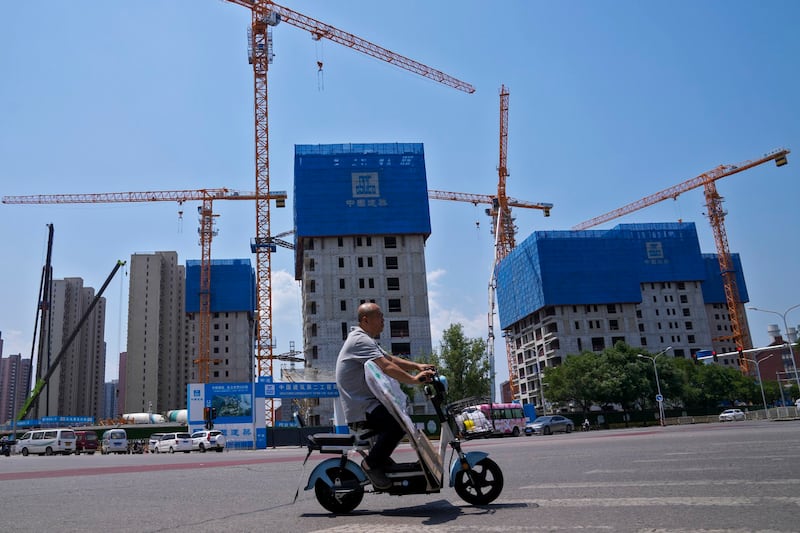Amid a spate of economic policies announced in recent days and Beijing’s intervention to arrest a slide in the stock market, Chinese equities rebounded Tuesday and Wednesday, but the overall gloom may be far from over for the world’s second-largest economy.
News broke on Tuesday that the “national team” – Beijing-charged fund managers – had stepped in to rescue the market as the country’s three major stock indexes continued to dive.
In a statement Tuesday, Central Huijin Investment, a subsidiary of China’s sovereign wealth fund China Investment Corp., said it endorsed the A-share stock market valuation, had recently expanded its holdings of exchange-traded open-end index funds. It said it would continue to increase and expand such holdings to ensure the stability of the capital markets.
On Monday, the benchmark Shanghai Composite Index fell below 2,700 points at one point, with thousands of stocks falling to their 10% daily limit. But Huijin’s statement which was widely disseminated via multiple state media outlets apparently took effect. The Shanghai Composite Index gained 3%, Shenzhen Component and ChiNext indexes rose 6% each on Tuesday.
A staggering 3 trillion yuan (US$422 billion) has been wiped off from the Shanghai and Shenzhen stock markets since the end of last year, according to some analysts who say the rescue measures may still be insufficient.
According to a Wall Street Journal report citing financial consultancy Z-Ben Advisors, China's five largest exchange-traded funds tracking the CSI 300 Index and the Shanghai Composite Index received a net fund of US$20.2 billion in January. The inflows – more than 10 times last year's monthly average – was a sign of China's "national team" in action. The report also cast doubt on investors' skepticism if the "national team" can end the stock market rout.
Wang Guo-Chen, an assistant research fellow at the First Research Division of the Chung-Hua Institution for Economic Research (CIER) in Taiwan, told Radio Free Asia he saw the national team’s attempt to reverse the bear market in the past few days as futile.
“We estimated that the market value of the Shanghai and Shenzhen stock markets has evaporated by about 3 trillion yuan since the end of last year. It was reported that 2 trillion yuan was injected to rescue the market, but it’s simply not enough to offset the past few weeks’ losses,” Wang said.
Separately, Bloomberg reported that the China Securities Regulatory Commission briefed Chinese President Xi Jinping on the state of the stock market on Tuesday. However, it was uncertain whether the authorities would table new measures.
Broader economic woes
While the stock market is not the economy, it is a barometer of where the latter may be heading and how investors view China’s prospects.
China is likely to set a 5% increase in GDP this year after about half of its provinces missed their 2023 targets. The country’s growth slowed to 5.2% in 2023, weighed by structural problems like mounting local government debts and the prolonged crisis in the real estate industry – a longtime driver of economic expansion – that authorities are struggling to fix.
On Tuesday, the National Financial Regulatory Administration said commercial banks have offered more loans to developers for projects under the favorable "white list."

Chu Chen-Chih, president of Marbo Investment Consulting pointed out that the various measures introduced by the Chinese government, including Premier Li Qiang’s pledge to inject more funds into the capital markets on Jan. 22, the state-owned Assets Supervision and Administration Commission’s move to evaluate stock market performance of enterprise controlled by Beijing, wouldn’t resolve China’s economic problems.
“The biggest problem in China now is the problem of the economy itself, not stock market policy. To cure a disease, you must treat it. The root cause of the disease is not just the external symptoms,” said Chu. “The Chinese government is trying to take some anti-fever drugs in the hope of alleviating a serious situation, but it isn’t the way to solve economic problems.”
On the street, the average Chinese retail investor likened the recent rout to the 2015 stock market carnage, according to vox pops conducted by China Business News. Almost nine years ago, Chinese shares plunged more than 40% between June and August, eliminating US$5 trillion of value, as the stock market bubble burst after regulators cracked down on illegal leverage trading.
In addition to the national team's rescue this week, a CSRC statement on Monday said it had discovered multiple cases of malicious short selling suspected of manipulating the market. Among them, an illegal gang controlled more than 100 securities accounts to manipulate a certain stock through continuous bidding and reverse trading to influence its price.
Wang from CIER said apart from vigorously promoting the market, China has three other options: first, to continue talking up China’s economy; if unsustainable, settle for the next best thing and tell the people, “It’s not good, but it will be better tomorrow”; and lastly, resort to coercive measures such as restrict IPOs [new share sales] or stock trading.
Translated by RFA staff. Edited by Taejun Kang and Mike Firn.
